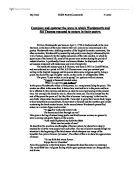Wordsworth has often been described as the poet of nature. He said of his early experience of nature that it was an unfailing source of " Joy of purest passion." How is this evident in his poetry?
Friday,22nd June,2001 Jon Hart
English Unit 3 - Pre C20th Poetry
Literature ~ Pre C20th Poetry
3) Wordsworth has often been described as the poet of nature. He said of his early experience of nature that it was an unfailing source of " Joy of purest passion." How is this evident in his poetry?
I believe that Wordsworth is the poet of nature and that he writes his poetry with joy and passion. This is most evident in 'The World is Too Much With Us' and 'Composed Upon Westminster Bridge'.
'The World is Too Much With Us' is about how Wordsworth feels about the fact that we rush about all the time. Wordsworth thinks that we do not relax and we are too materialistic.
This poem is a petrachan sonnet. A petrachan sonnet has fourteen lines. This kind of sonnet has a rhyming pattern of 'A,B,B,A' in the octave, and 'C,D,C,D' in the sestate. This poem also has iambic pentametre which means in each line there are five stressed syllables and five unstressed syallbles.
The first two lines in this poem are about how we spend our time in the world.
'The world is too much with us;late and soon
Getting and spending, we lay waste our powers:'
This shows that Wordsworth feels we rush about too much and never take time to relax. Wordsworth also feels that we have become too materialistic which means that we always want bigger and better things.
English Unit 3 - Pre C20th Poetry
Literature ~ Pre C20th Poetry
3) Wordsworth has often been described as the poet of nature. He said of his early experience of nature that it was an unfailing source of " Joy of purest passion." How is this evident in his poetry?
I believe that Wordsworth is the poet of nature and that he writes his poetry with joy and passion. This is most evident in 'The World is Too Much With Us' and 'Composed Upon Westminster Bridge'.
'The World is Too Much With Us' is about how Wordsworth feels about the fact that we rush about all the time. Wordsworth thinks that we do not relax and we are too materialistic.
This poem is a petrachan sonnet. A petrachan sonnet has fourteen lines. This kind of sonnet has a rhyming pattern of 'A,B,B,A' in the octave, and 'C,D,C,D' in the sestate. This poem also has iambic pentametre which means in each line there are five stressed syllables and five unstressed syallbles.
The first two lines in this poem are about how we spend our time in the world.
'The world is too much with us;late and soon
Getting and spending, we lay waste our powers:'
This shows that Wordsworth feels we rush about too much and never take time to relax. Wordsworth also feels that we have become too materialistic which means that we always want bigger and better things.







